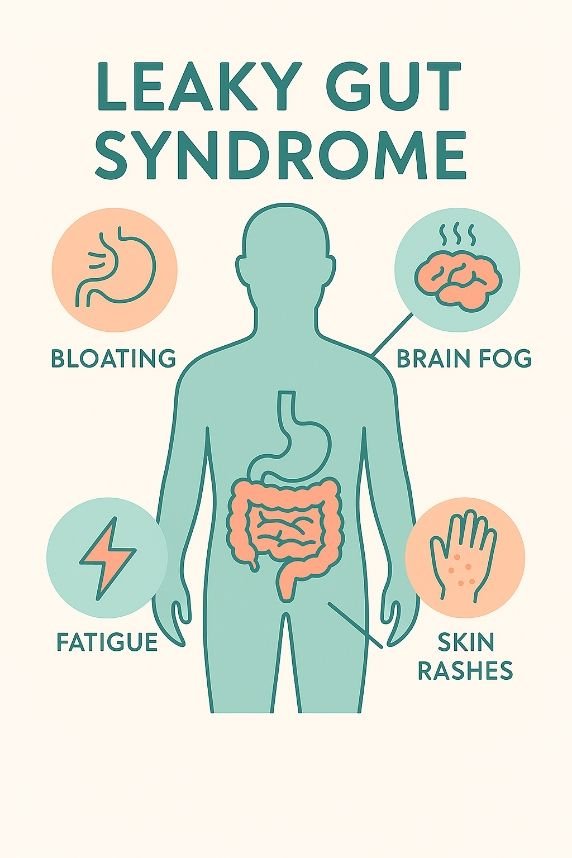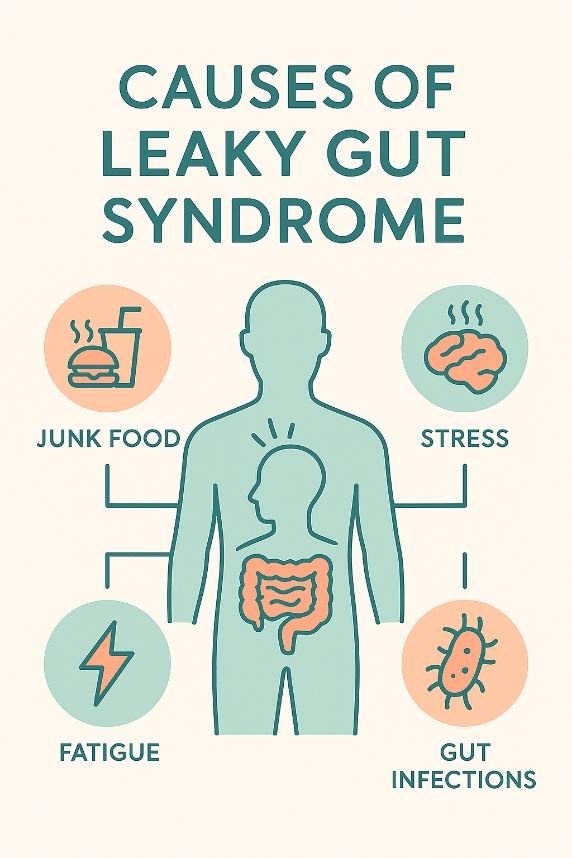Leaky gut syndrome is something that, many people don’t even realize they have until the symptoms get really worse. This condition, where the lining of your intestines become more permeable than it should, can lead to a cascade of health problems. From bloating and fatigue to autoimmune issues, the impact of leaky gut syndrome can be far-reaching.

The tricky part is, it’s not always easy to notice until its already affecting your life in many ways.
In this guide, we will explore exactly what leaky gut syndrome is, the most common symptoms, its potential causes, and natural solutions that actually help. We will also connect how stress and poor sleep can worsen gut issues, linking to our earlier discussion in How Blue Light Affects Sleep. Plus, we’ll connect to our upcoming article on The Hidden Link Between Stress and Gut Inflammation to give you the complete picture.
Many people go years without realizing their gut health is slowly declining. Symptoms might start small — occasional bloating after meals, random fatigue, or unexplained skin breakouts. Over time, these warning signs become harder to ignore, yet they are often mistaken for unrelated issues. Modern lifestyles filled with processed foods, chronic stress, and lack of sleep create the perfect storm for gut problems to develop. Understanding leaky gut syndrome is the first step in taking back control of your health.
What Is Leaky Gut Syndrome?
Leaky gut syndrome happens when the tight junctions in your intestinal wall start to loosen. Think of your gut lining as a fine mesh net that allows only certain nutrients and water to pass through into the bloodstream, while blocking harmful substances. In leaky gut syndrome, that net gets holes in it — big enough for toxins, undigested food particles, and bacteria to leak into the bloodstream.
When this happens, your immune system goes into overdrive. It’s like having your home door left wide open at night — anything can get in, and you’re constantly on alert. Over time, this can lead to chronic inflammation, which affects not only your digestion but your overall health.
While the medical community continues to research leaky gut, many functional medicine practitioners see it as a foundational issue behind various chronic illnesses. Imagine your digestive tract as a busy border crossing: when everything is functioning well, only approved nutrients pass through. But in leaky gut syndrome, that border becomes weak and porous, allowing substances that should never enter your bloodstream to slip in. This not only overwhelms your immune system but also sets off a chain reaction that can impact hormone balance, mental clarity, and even mood regulation.
Common Symptoms of Leaky Gut Syndrome

Leaky gut syndrome symptoms can be sneaky. Some people only experience mild digestive discomfort, while others suffer from symptoms that seem unrelated to the gut at first glance.
1. Digestive Issues
Bloating, diarrhea, constipation, and gas are some of the most common signs. Many people think these are just “normal” stomach issues, but they can be signals that your gut lining is compromised.
2. Food Sensitivities
When your gut is leaky, larger food particles can slip into the bloodstream, triggering immune reactions. This often leads to new or worsening food sensitivities.
3. Fatigue and Brain Fog
Leaky gut syndrome doesn’t just stay in the gut. The inflammation it causes can affect your brain, leading to difficulty concentrating, forgetfulness, and feeling tired all the time.
4. Skin Problems
Conditions like eczema, acne, and psoriasis have been linked to poor gut health, including leaky gut syndrome.
5. Autoimmune Conditions
Some researchers believe leaky gut syndrome may be a trigger for autoimmune diseases like Hashimoto’s, rheumatoid arthritis, and lupus.
It’s important to remember that leaky gut symptoms can differ greatly from person to person. For some, digestive discomfort may be the primary issue, while others experience symptoms far removed from the gut, such as migraines, chronic joint pain, or even seasonal allergies that worsen unexpectedly. Because the gut is linked to so many systems in the body, a single underlying problem can manifest in multiple ways — making it essential to address the root cause rather than just treating individual symptoms.
Causes of Leaky Gut Syndrome

There are several factors that can contribute to the development of leaky gut syndrome, and often, more than one factor is at play.
Poor Diet
Eating a diet high in processed foods, sugar, and unhealthy fats can weaken your gut lining. For example, excess sugar feeds harmful bacteria, which can damage the intestinal wall.
Chronic Stress
Stress hormones like cortisol can break down the gut lining over time. If you want to learn more about stress effects, our Cluster 4: The Hidden Link Between Stress and Gut Inflammation will go deeper into this topic.
Overuse of Medications
Certain medications — especially NSAIDs like ibuprofen — can irritate and damage the gut lining.
Gut Infections and Imbalance
An overgrowth of harmful bacteria or yeast can lead to inflammation and intestinal permeability.
Poor Sleep Quality
As explained in Blue Light and Sleep, disrupted sleep affects your body’s ability to repair tissues, including the gut lining.
Environmental factors also play a significant role in gut health. Exposure to toxins in household cleaning products, pesticides on produce, and even chemicals in personal care products can disrupt the delicate balance of the gut microbiome. Over time, these small exposures add up, contributing to inflammation and weakening the intestinal barrier. This is why holistic healing often includes reducing toxic exposure alongside dietary and lifestyle changes.
Natural Fixes for Leaky Gut Syndrome

Here’s the good news: leaky gut syndrome can be improved, and in some cases, reversed with lifestyle changes and targeted supplements.
1. Clean Up Your Diet
Focus on whole, unprocessed foods. Include fiber-rich vegetables, lean proteins, healthy fats, and fermented foods like sauerkraut or kimchi.
👉 Check this probiotic supplement on Amazon
🛒 Buy now from Amazon
2. Reduce Stress
Incorporate stress-reducing activities such as yoga, meditation, and deep breathing exercises.
👉 See this calming tea blend on Amazon
🔗 View product on Amazon
3. Support Gut Lining Repair
Supplements like L-glutamine, zinc, and collagen may help restore the gut barrier.
👉 Shop collagen peptides on Amazon
🛒 Get it now from Amazon
4. Improve Sleep Quality
Reduce screen time before bed and follow the tips in our article.

5. Avoid Gut Irritants
Limit alcohol, processed foods, and unnecessary medications.
Another helpful approach is practicing mindful eating. Eating slowly, chewing thoroughly, and avoiding overeating can reduce the strain on your digestive system and give your gut lining the chance to heal. Pairing meals with digestive enzymes or drinking herbal teas like chamomile and ginger after eating can also support digestion and nutrient absorption. Remember, restoring gut health is not just about removing harmful things but also consistently adding in the practices and nutrients that nourish your body.
Living Well with a Healthy Gut
Healing from leaky gut syndrome is a journey, not an overnight fix. With consistent changes in diet, stress management, and sleep habits, many people experience significant improvements in just a few months.
Once your gut health starts to improve, you may notice unexpected benefits such as clearer skin, more stable energy levels, and improved mood. Maintaining a balanced gut can also strengthen your immune system, making you less prone to seasonal colds and other infections. By staying consistent with healthy habits, you’re not just healing your gut — you’re laying the foundation for long-term vitality and resilience.
Internal Links:
How Blue Light Affects Sleep
The Hidden Link Between Stress and Gut Inflammation
